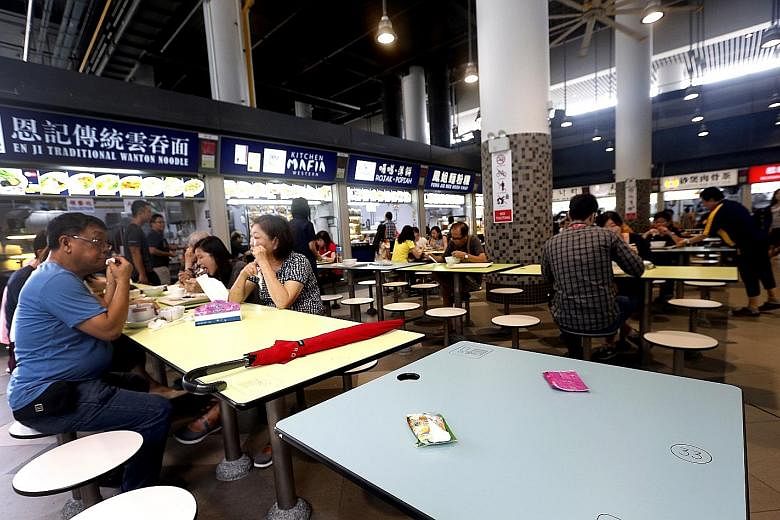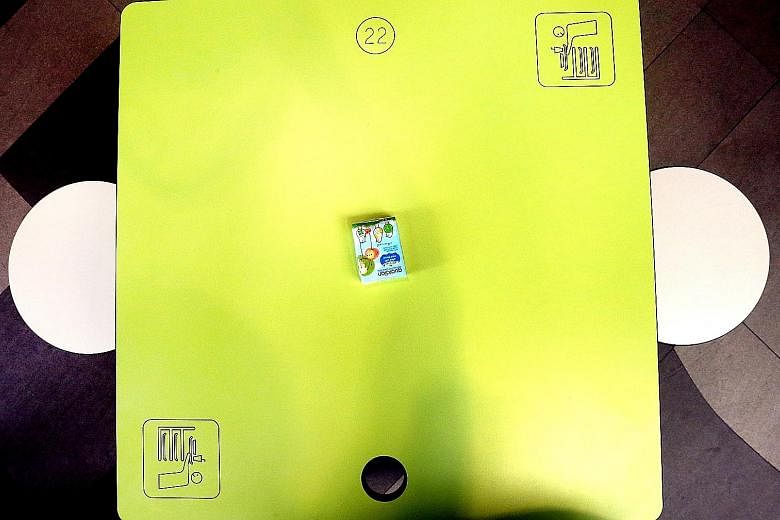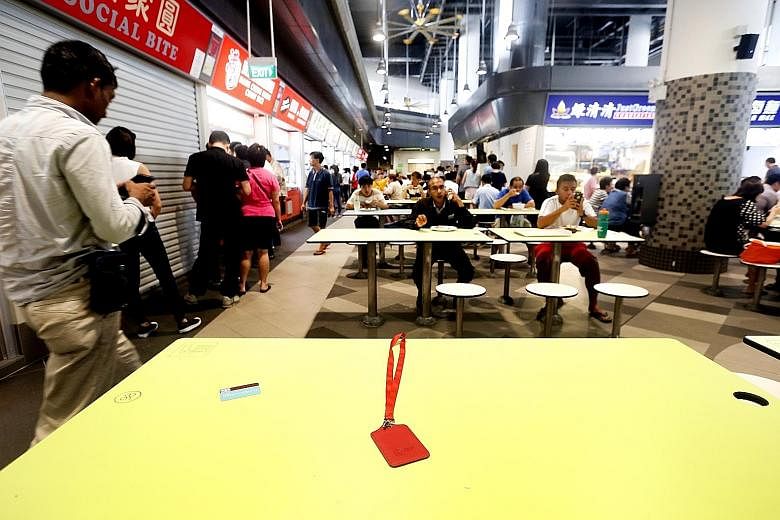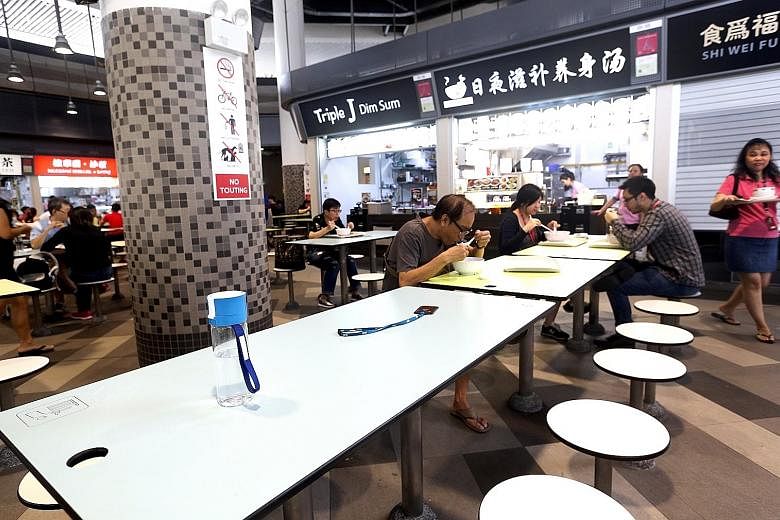It is 1pm at Maxwell Food Centreand the popular hawker centre is bustling with a lunchtime crowd.
A Hong Kong tourist, Ms Abbie Lam, 24, with her three-year-old niece in tow, approaches a table where a man in office attire sits, surrounded by five unoccupied seats.
Perspiring after hunting for seats for the past 10 minutes, Ms Lam is about to sit down when the man tells her all the seats are taken. He gesticulates to their "occupants" - one name card on each seat.
The puzzled tourist walks away.
"In Hong Kong, this doesn't happen," Ms Lam, a market research assistant on her second holiday here, told The Sunday Times later. "If someone wants to sit, we'll move our things away for them. This is the first time this has happened to me, so I found it strange."
-
Reserved... even on beaches
LONDON • Reserving plum spots on the beach with towels or deck-chairs, sometimes overnight and by tourists, have raised the ire of many Europeans.
The Italians have had enough of what La Repubblica daily denounced as an "ancient and ingrained habit" and moved to discourage the practice last year.
In a scheme dubbed Operation Sea Safe, the Italian authorities decreed that any holidaymakers that leave their beach towels overnight to bag the best spot would face fines of up to €200 (S$298).
Cecina, Tuscany has actually made it a crime to leave any unattended belongings on the beach before 8.30am, but the rules appear to vary from place to place around Italy.
The authorities have also begun seizing paraphernalia used for reserving spots, including deckchairs, umbrellas, towels and even swimming suits, according to Britain's Sun daily.
The British-German "towel war" is notorious on the continent. Germany's Bild newspaper, for example, observed British tourists at a resort in Alcudia, Majorca, placing their towels on loungers to "reserve" them as early as 6am. One Briton went the extra mile by using a towel with the word "reserved" on it.
By 8.51am, all of the loungers were taken, but the holidaymakers were nowhere to be seen, Bild wrote.
Bild said that its investigations revealed that the Germans and British were the "undisputed masters" of the art of sunbed blocking.
The investigation, no doubt, surprised many British tourists who, judging by British media reports, complain often that Germans usually beat them to the best loungers by waking early.
Singaporeans have a habit of reserving seats in food centres - which have free seating - by putting items such as name cards, tissue packets, umbrellas, staff passes or plastic bags on them.
Depending on who you ask, this idiosyncratic practice of "choping" seats is either a practical life hack or an ungracious act.
After the Government announced last month that a $90-million fund will be set up to boost the hawker trade, a number of ST readers wrote in, asking for something to be done about the "choping" of seats at hawker centres.
The practice, they said, has led to quarrels and created scenarios where elderly patrons carrying trays of food are deprived of a seat.
Others argued that tourists who have been brushed away by locals defending their reserved seats come away with a tarnished image of Singaporeans, although the Singapore Tourism Board said it has not received any feedback about this.
One letter-writer, Ms Davi Beschizza, recounted an argument she had with a man who used tissue paper to reserve a table for six, while he and his companions ordered food at the hawker centre.
When Ms Beschizza, who was looking for a seat while carrying a tray with a bowl of hot soup, told him it was unfair of him to reserve seats, he retorted that "it is Singapore-style" and argued with her, using expletives, she claimed.
"There are no positives to this habit of reserving tables," she said.
Another letter-writer, Mr Ronald Lee suggested that signs be put up in hawker centres stating that reserving seats is not allowed.
He told The Sunday Times he had been turned away by people reserving seats. He noticed that these seats were still unoccupied when he had finished eating.
Mr Lee, 77, a retiree, said: "What gives people the privilege to reserve seats? I call them bullies."
He said that if he is seated while waiting for his companion to buy food, he would give up the other seat to diners who ask for it.
On the flip side, others argue that "choping" seats is practical. "We want to ensure we have seats. Otherwise, our food will turn cold while we look for seats," said a human resource manager, 34, who only wanted to be known as Sharon. She and four friends had used tissue packets to reserve seats at People's Park Food Centre last week.
Finance assistant manager Angeline Lau, 50, who uses a tissue packet to chope a seat when she is dining alone, said: "If I don't, I'll end up carrying my food and going around looking for a seat."
Others said there are some situations that warrant the reserving of seats, such as seniors waiting for their children who are buying food for them or young children waiting for their parents.
So, to chope or not to chope?
Dr William Wan, who sits on the Hawker Centre 3.0 Committee convened by the Government to help rejuvenate Singapore's hawker scene, called on diners to give priority to those with food in hand.
"While there is nothing to stop people from sitting at tables waiting for their food to come, they should, in the spirit of give-and-take and empathy, offer their seats to those with food in hand," said Dr Wan, who is also general secretary of the Singapore Kindness Movement.
The National Environment Agency (NEA) said there are no restrictions on reserving seats in hawker centres. "However, patrons should always exercise consideration for others when dining at the hawker centres and sharing the facilities," said an NEA spokesman.
At least one hawker centre, at Our Tampines Hub, has introduced a set of house rules, including "Don't chope seats" and "Share your table", which are featured in its wall art mural as a visual reminder to patrons.
"We will extend the same messages in our other hawker centres where possible," added the NEA spokesman.
Ms Lau said unknowing tourists have sat on the seat she had reserved. "I just leave the tissue packet with them and look for another seat. Why quarrel over this?"





